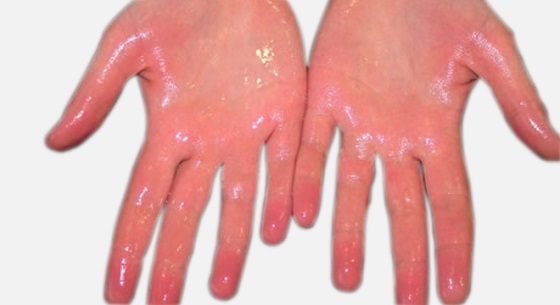Comprehending the Source of Excessive Sweating and Its Effect on Day-to-day Live
Excessive sweating, also recognized as hyperhidrosis, is a condition that influences a significant part of the populace, yet its hidden reasons and implications on daily working stay rather enigmatic. While it is typically comprehended as a physical feedback to regulate body temperature, the triggers for excessive sweating can vary commonly among people, including not just physical aspects yet additionally psychological and psychological aspects. Moreover, the effect of this problem prolongs past simple discomfort, typically influencing social interactions and overall quality of life. By delving right into the source of hyperhidrosis and exploring its complex effects, a much deeper understanding of this prevalent problem can be gotten, clarifying the intricacies that individuals grappling with excessive sweating browse daily.
Physiology of Sweat Glands
The law of sweat production, a vital physical process, is primarily managed by the activity of gland distributed across the human body. Gland are categorized right into 2 major types: eccrine and apocrine glands. Eccrine glands are one of the most many and are found in mostly all areas of the body. They play an essential role in thermoregulation by secreting a watery liquid onto the skin's surface, which vaporizes and assists cool down the body down. On the other hand, apocrine glands are concentrated in locations rich in hair roots, such as the underarms and groin, and their secretions are thicker and milklike in appearance.
When the body temperature level rises, either because of exercise, heats, or psychological stress, the nerves causes the sweat glands to generate sweat. This sweat is made up primarily of water and electrolytes like sodium and chloride. The procedure of sweat manufacturing is essential for preserving the body's interior temperature level within a narrow, ideal variety, highlighting the important role sweat glands play in human physiology.
Triggers for Excessive Sweating
In recognizing the origin triggers of excessive sweating, it is crucial to identify the triggers that can lead to this physical action. Physical exertion, high temperature levels, and spicy foods are additionally known to cause extreme sweating in people susceptible to this condition.
Furthermore, drugs such as some antidepressants, opioids, and specific supplements can also function as triggers for hyperhidrosis. Comprehending these triggers is essential in managing excessive sweating successfully - Sweaty hands treatment. By identifying and dealing with the certain triggers that prompt too much sweating in a private, medical care carriers can create customized therapy strategies to relieve this problem and enhance the person's quality of life
Medical Issue Associated
Connected with excessive sweating are numerous clinical problems that can worsen this physical reaction. One common condition is hyperhidrosis, a problem identified by unusually enhanced sweating that exceeds the body's thermoregulatory needs. This can manifest in focal areas like the hands, soles, underarms, or face, influencing an individual's lifestyle as a result of social shame and discomfort.
Furthermore, endocrine disorders such as hyperthyroidism, diabetic issues, and menopausal hot flashes can also lead to too much sweating. Hyperthyroidism triggers an overflow of thyroid hormones, speeding up metabolism and activating sweating. Diabetes mellitus can generate sweating episodes, particularly during hypoglycemic episodes when blood glucose levels drop as well low. Menopausal hot flashes, credited to hormonal variations during menopause, can create extreme and unexpected sweating, commonly gone along with by flushing and heart palpitations.
Moreover, infections like hiv, endocarditis, and consumption have actually been connected with evening sweats, a typical sign recognized to interfere with sleep and affect general health. These medical conditions highlight the varied series of underlying variables that can add to too much sweating, demanding comprehensive assessment and management by healthcare experts.
Mental and psychological Elements

Effect On Social Communications
Too much sweating can have profound impacts on an individual's capacity to engage easily in social interactions. The noticeable indications of sweat stains or wet spots on apparel can cause embarrassment and self-consciousness, triggering individuals to take out from social scenarios. This withdrawal can affect relationships, restriction social tasks, and prevent specialist and personal development.

Furthermore, the anxiousness and self-confidence problems coming from extreme sweating can influence interaction and interpersonal skills. Individuals may have a hard time to focus on conversations, join team tasks, or reveal themselves confidently. This can cause sensations of seclusion and solitude, as social connections become challenging to maintain.
Conclusion

While it is generally recognized as a physiological response to regulate body temperature level, the triggers for too much sweating can vary extensively amongst individuals, including not just physical aspects yet psychological and additionally psychological components. By diving into the root triggers of hyperhidrosis and exploring its complex results, a deeper understanding of this prevalent issue can be obtained, shedding light on the intricacies that individuals grappling with excessive sweating browse on an everyday basis.
Physical exertion, high temperature levels, and spicy foods are also understood to activate excessive How to stop sweaty hands sweating in individuals prone to this condition. By identifying and addressing the particular triggers that trigger too much sweating in a specific, medical care suppliers can create tailored treatment strategies to reduce this condition and improve the individual's top quality of life.
Extreme sweating can have profound impacts on a person's ability to engage easily in social communications.
Comments on “Best Dermatology Approaches for Sweaty Hands Treatment: Tips and Techniques”